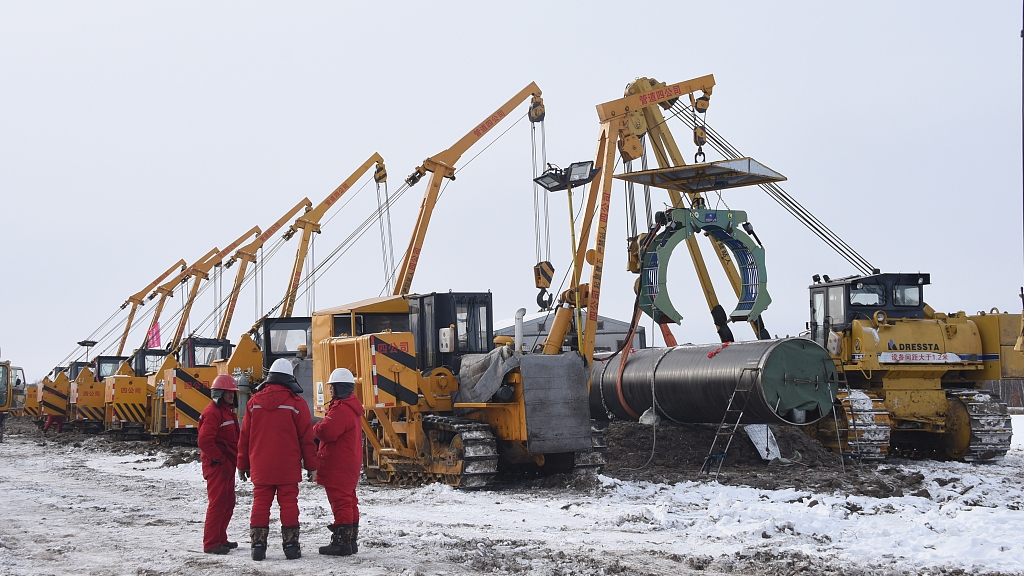
Construction site of China-Russia east-route natural gas pipeline project in Heihe, northeast China's Heilongjiang Province, January 25, 2018. /VCG Photo
Construction site of China-Russia east-route natural gas pipeline project in Heihe, northeast China's Heilongjiang Province, January 25, 2018. /VCG Photo
The newly commissioned 3,000 kilometer-long Russian-China gas pipeline is a "benchmark project" that will significantly boost China's energy supply with the added effect of reducing pollution, according to an academic from Xiamen University.
Lin Boqiang, dean of China Institute for Studies in Energy Policy, told CGTN's Global Business that China has been trying hard to diversify its energy imports, mainly shifting away from coal to natural gas.
"It will add to China's energy supply in a tremendous way, about 14% of it. The implication is energy security," he said.
Lin said that northeastern China, the region that is receiving the new flow of gas from this month onwards, will benefit economically from the pipeline.
"We hope cheaper energy prices will become an important factor for industrialization of this region," he said, explaining that the area has seen economic challenges in recent years.
06:19

Lin also said the new energy source was vital from an environmental perspective in terms of pollution reduction, as northeastern China depends largely on coal-fired power plants.
The 'Power of Siberia' gas pipeline
The 3,000 km-long pipeline, called the "Power of Siberia" gas pipeline, will begin delivering Russian gas to China Monday. It has an export capacity of 38 billion cubic meters per year.
The new pipeline, built by Russian energy giant Gazprom, is the largest gas transmission system in Russia's East. It will begin delivering gas from Siberia to Blagoveshchensk, near the Russian-Chinese border. From there it's picked up by a Chinese pipeline that takes it into neighboring Jilin Province.
Next year the gas pipeline will be extended into Hebei Province near Beijing. And by 2024, Russian gas will reach Shanghai, servicing some of China's largest industrial hubs on the eastern seaboard.
China is now the world's largest natural gas importer and the second largest liquefied natural gas (LNG) importer. It consumed 200 million tons of natural gas last year, with almost half of that amount imported.
Russia, meanwhile, currently produces no more than 30 million tons of natural gas a year, and intends to expand its production five times to up to 140 million tons in the next two decades.
Meanwhile, Lin said that U.S. companies continue to suffer "substantial losses" as exports the commodity from the U.S. to China since April has dropped to zero.
In 2018, Amid the China-U.S. trade war, China imposed a punitive duty on U.S. liquefied natural gas (LNG) and then raised it to 25 percent this year.
"It is bad news for U.S. companies," Lin said. "LNG or oil were always big ticket items as countries would buy in quite substantial numbers. It was quite a good number before the trade tensions.
"We are hoping there's some agreement between the U.S. and China. That would help also domestic U.S. gas infrastructure development."
(CGTN's Michael Wang contributed to this story)